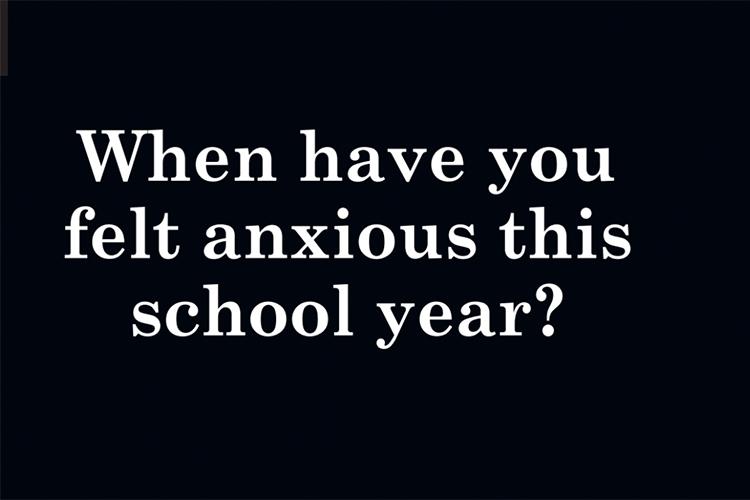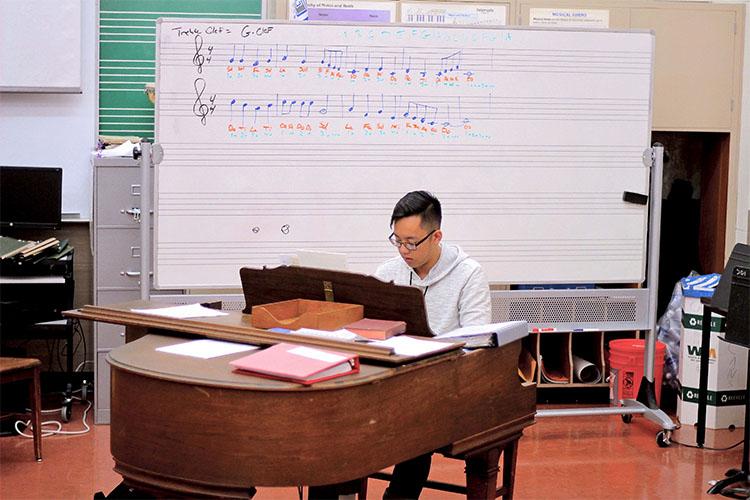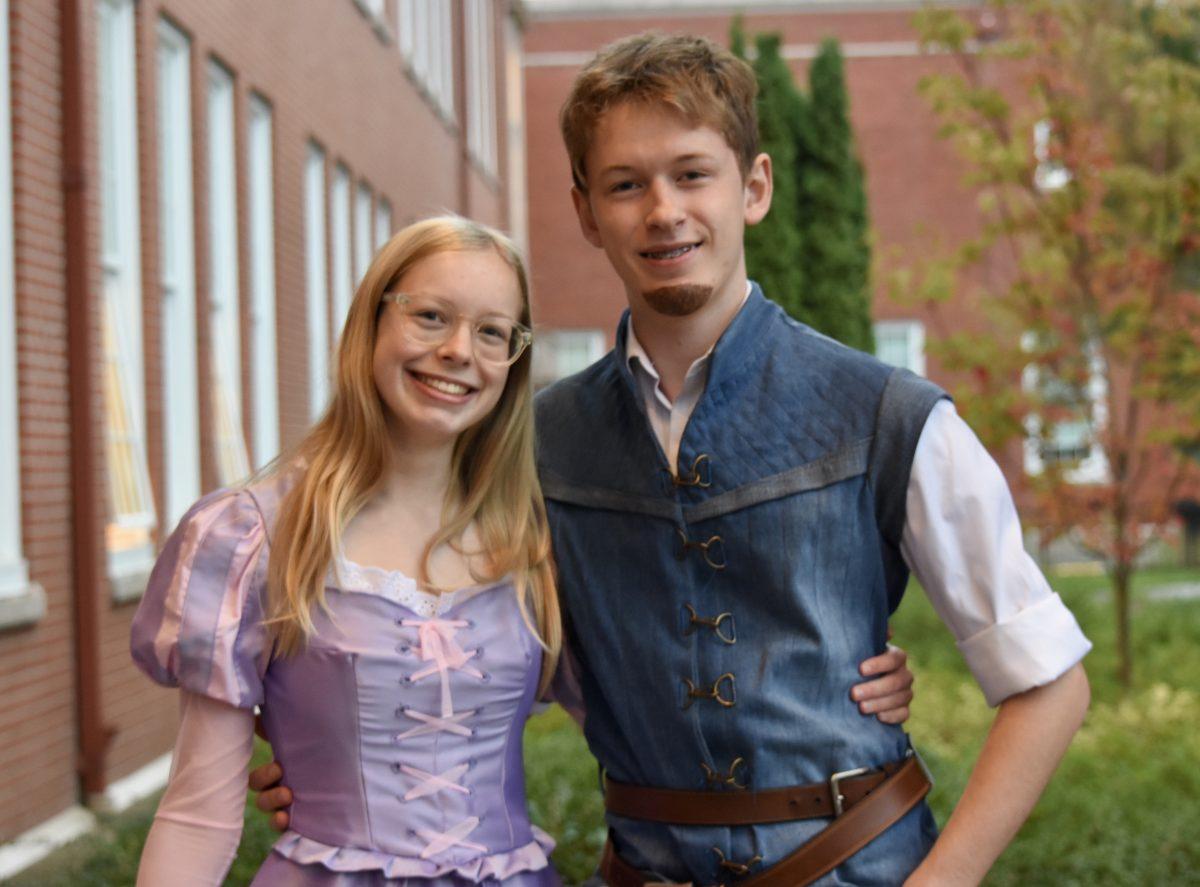
When Jade Leeman was in eighth grade, she decided to write a slam poem about onions. Leeman didn’t feel a particular connection to the topic, but she hoped that she would learn from the challenge.
After typing out a draft on her phone, she stared at what she had written. “Onion skin being peeled away because no one lets themselves be shown, and nobody tells the truth,” she wrote.
The words that had flowed out of her had felt distant as she wrote them, as if they belonged to someone else. But as Leeman read over the words of her poem, she realized their impact. Emotions that she had kept to herself were suddenly in the open. Leeman knew that she had to share them.
Her poem reflected on her recent experiences of struggling with her mental health as she tried to understand her gender identity. “I feel like when I entered a state where I was just writing everything, that sort of naturally came out,” says her.
Growing up in a family that values learning and storytelling, Leeman was encouraged to explore writing from a young age. While she already knew the importance of storytelling, slam poetry was a new form of self-expression for Leeman.
Leeman was born into a family of learners. Her father and two of her grandmothers worked as teachers. Before she entered school, Leeman spent much of her time in her father’s high school classroom, or reading and learning about various arts and crafts with her grandmother, Reva Leeman.
Jade Leeman was encouraged to read with her grandmother when they spent time together, though she hated doing so at first. Leeman was not yet a confident reader, so to her it felt difficult and tedious. But once her grandmother made reading time into “reading and cookie time,” feeding Leeman cookies every time they read together, she was hooked on reading.
“I got to eat one or maybe even two cookies while I read with her, and just like that I enjoyed reading,” she says.
Reva Leeman would often draw and play with modeling clay with Jade Leeman. She enjoyed creative activities with her grandmother because she could use them to tell stories. “We would have to draw a story,” says Reva Leeman. “And if we played with modeling clay we were making a civilization with things in it.”
Leeman’s father, Dylan Leeman, recalls his daughter being exposed to various math and science textbooks, which he provided. Leeman was consistently eager to learn about what was inside of them. “She got so into it,” says her father. “She was asking me questions that I didn’t have the answer to.”
While Dylan Leeman enjoyed teaching his daughter, he recognized that some areas were beyond him. When Leeman began taking Japanese at Richmond Elementary School, she started getting tutored by her father’s high school students who were taking Japanese at Grant. “Even when (Jade and her tutors) weren’t doing school work, they were often doing intellectual pursuits, and exploring ideas and playing with computer stuff,” says Dylan Leeman. “It was a space for learning. But sort of a more creative one, when the Japanese was done.”
With learning emphasized as a positive activity when she was young, Leeman grew to love seeking out new experiences. The activities that she found most satisfying were usually those that allowed her to tell stories.
When she was eight, a family friend introduced Leeman to the role-playing game Dungeons and Dragons. A game whose storyline is influenced both by medieval myths and stories that its players create, Dungeons and Dragons became a place for Leeman to exercise her storytelling muscles. “I enjoy exploring it a lot,” she says about the Dungeons and Dragons world. “I’d be on a bus ride for half an hour, and I’d just have 20 tabs of similar but slightly different D&D spells open on my phone because I was just reading through them.”
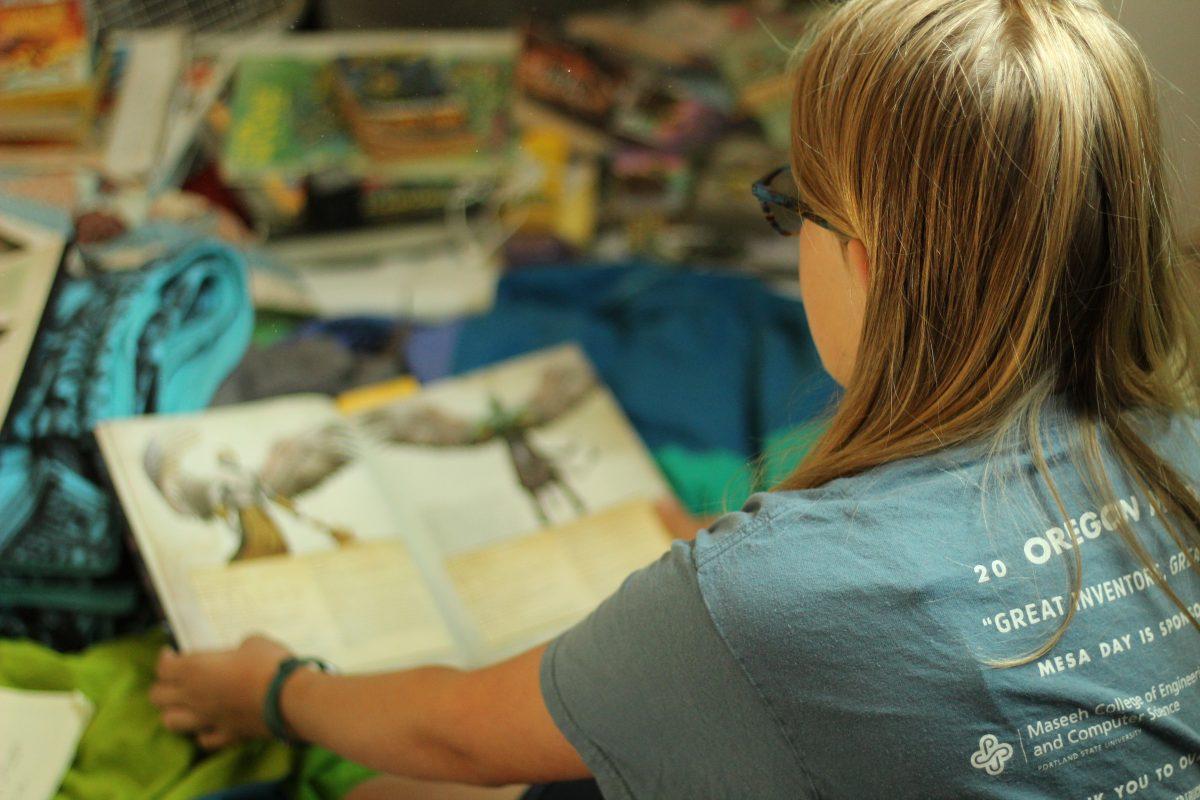
Leeman soon discovered other types of role-playing games as well, including Pathfinder and Savage Worlds. She began leading role-playing games for her school friends during recess as a fifth grader.
When Leeman entered middle school, it became impossible for her to continue playing role-playing games during recess, due to a shorter lunch and recess period. She found herself playing role-playing games less and less. “It was disappointing,” says Leeman. “Early in sixth grade we were like yeah, we can’t make this work, there’s just not enough time.”
In seventh grade, Leeman began to question her gender identity. Feeling unsure of who she was, she began to feel isolated and alone in her struggles. “It was complicated, and weird, and I didn’t understand myself, and I didn’t understand my mental health,” she says.
Leeman began experiencing depression and felt herself withdrawing from some of her relationships. “(I was) somehow simultaneously self-righteous and really lost. Probably self-righteous to cover up the being really lost,” she says.
When Leeman came out as transgender to first her friends and then her family in middle school, she was met with nothing but love and support. “In that way I am really lucky, to … be surrounded by the people I’m surrounded with, and live where I live,” she says.
Leeman wasn’t sure how or when she would process her emotions about her struggles with her gender identity until she wrote her poem about onions as an eighth grader. Though she didn’t set out to write a poem reflecting on her experiences with questioning her gender and coming out, as she wrote she could feel herself releasing feelings that had prevented her from healing.
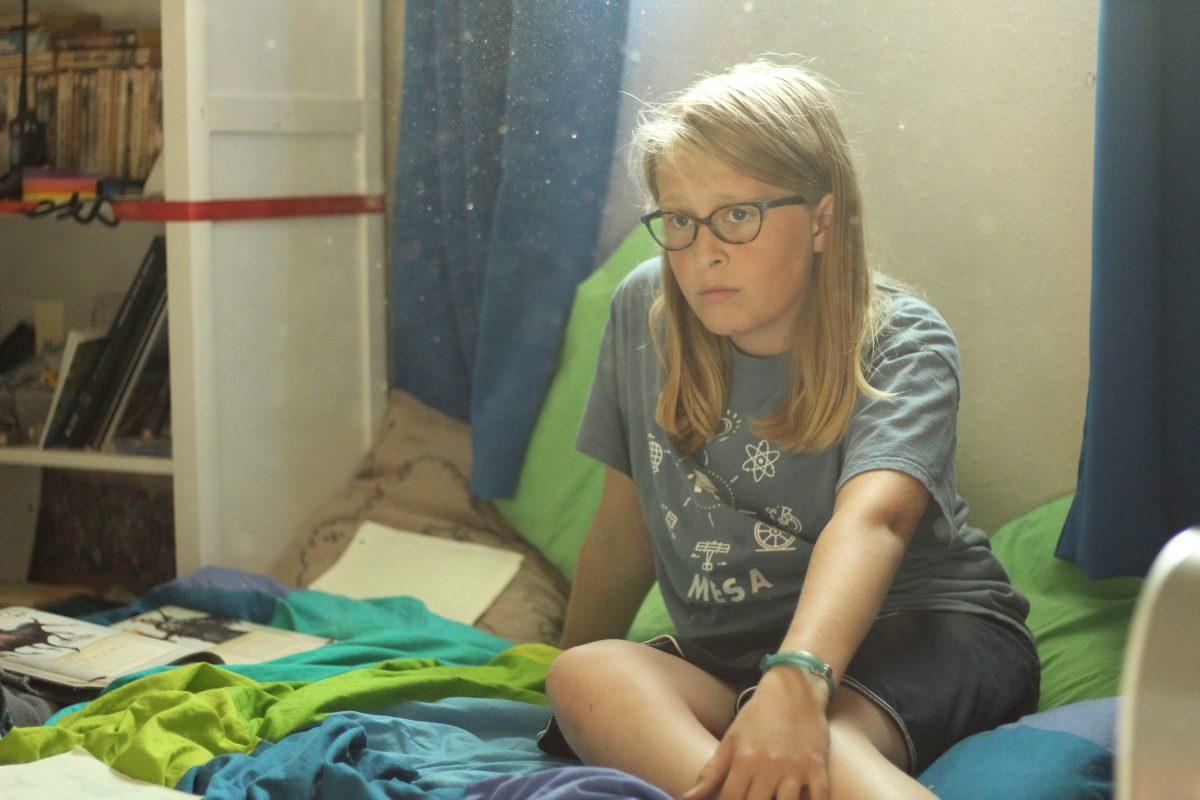
Leeman’s writing process allowed her to reflect. “It’s not the same as just all out feeling those things, (because) I am channeling them and it’s cathartic,” she says of writing poetry. “I think (my poem) was primarily a reflection on things I’d struggled with recently, because it was … during the time when I was healing.”
Leeman was able to enter her freshman year at Grant feeling more self-assured. “It just needed time, I think. And love and support,” she says of her healing process. “Time and therapy and cathartic acts.”
Early in Leeman’s freshman year, one of Grant’s vice principals, KD Parman, approached Dylan Leeman and asked if his daughter would be willing to speak in front of Basic Rights Oregon, an organization that works to fight discrimination against LGBTQ+ Oregonians.
At the time, Basic Rights Oregon was defending the rights of a student in Dallas, Oregon, to use the locker room that aligned with his gender identity, which was different than the gender he was assigned at birth. Members of Basic Rights Oregon asked Parman, who used to work with the organization, if she knew of any students who would be interested in providing perspective in the case.
Leeman stood out to Parman as a great candidate. “She comes across as super self-confident, self-assured and like, really articulate about … where she’s coming from,” says Parman about Leeman. “She seems like someone who, in seeing her in the hallways and talking to her briefly, she’s very sure of who she is and what she believes.”
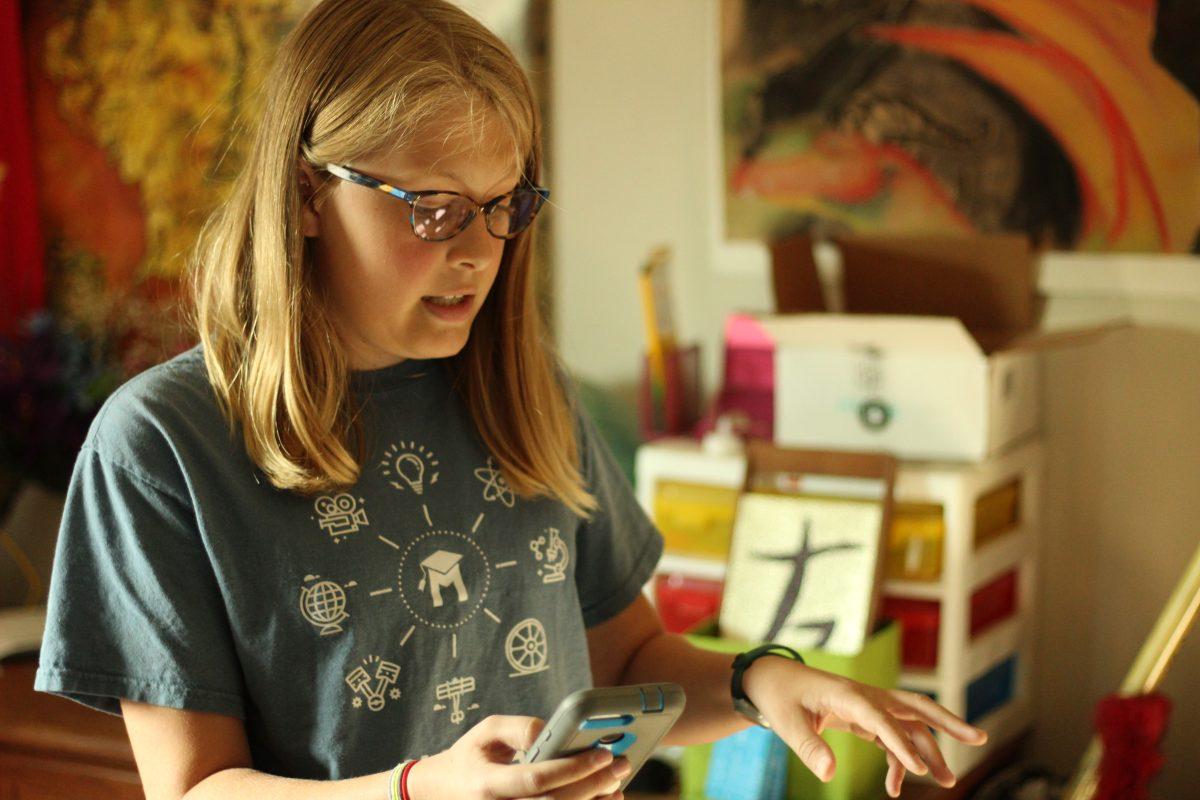
Dylan Leeman remembers his daughter enthusiastically agreeing to give a speech for Basic Rights Oregon. “When I brought it to her and hadn’t even finished explaining what it was, she said yes, she wanted to do it,” he says.
When creating her speech, Leeman wrote, in detail, about the experiences that inspired her onion poem. Though she was not the main focus of the event, she was incredibly nervous to share her story.
Similarly to when she wrote her poem, Leeman did not feel the full weight of her words until she was in the midst of writing them. “Writing it down was hard (because) it was like fully recognizing (my struggles),” she says.
Her heart began to pound when it hit her that she would be talking about her intimate struggles with her gender and mental health in front of news channels and her family.
As she walked up to the podium to speak, her head was filled with doubt. While Leeman was thankful for her family’s support, having them in the audience made her more anxious to share her speech. “It couldn’t be, like, an imaginary thing. It was something I was saying, like, for real, and my family was there hearing it,” she says.
But when she began her speech, Leeman was confident that her decision to perform it was the right one, partially because it allowed her to advocate for LGBTQ+ rights. Giving her speech in front of Basic Rights Oregon also helped Leeman find closure for her own struggle with finding her gender identity.
“In some ways I’d sort of put (my struggles) behind me. So it was, you know, almost like reopening an old wound,” she says. “But on another level, you know, arguably it healed better this time.”
Confident with the knowledge that storytelling helped her find catharsis, Leeman jumped at the opportunity to compete in the annual Grant Poetry Slam — where students perform slam poems in front of judges — during April of her freshman year.
Leeman decided to perform her onion poem, and was eager to finally share it out loud. “You fear (slam poems) lose something when only on paper,” she says.
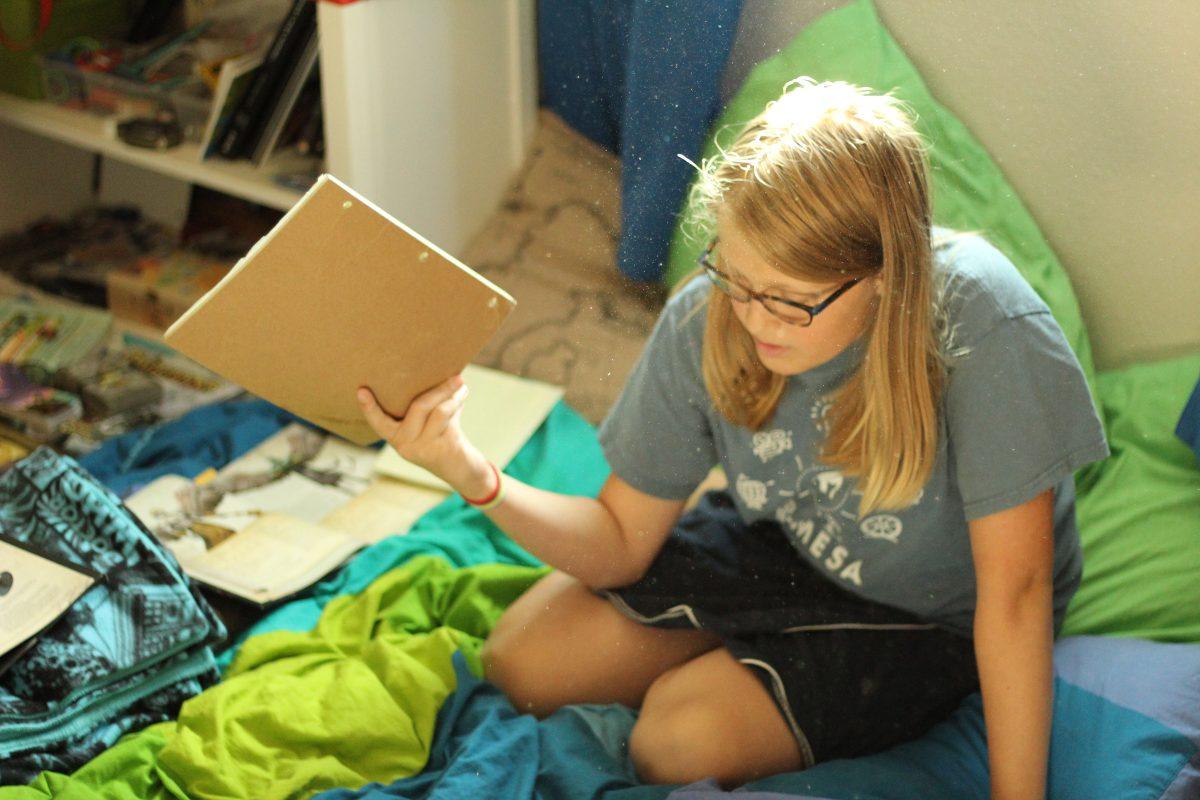
At the poetry slam, she also shared a poem responding to the deaths of her close friend and her grandfather, which had taken place in a quick succession. “The whole point of my writing that was catharsis,” she says.
Leeman came in third place at the Grant Poetry Slam, which allowed her to go to Verselandia, the citywide high school slam poetry competition, as an alternate performer. This means that Leeman would only perform if one of the top two finalists from Grant was unable to compete.
“It seemed like most people were not there like, ‘I’m gonna win,’” says Leeman of Verselandia. “It was like, ‘I’m here to share my story. To share my poem, and however it goes, so be it.’” The supportive environment of Verselandia made Leeman excited to write more poems about things she cares about.
Now, after using storytelling to process her experiences, Leeman feels confident in herself. “Acknowledging myself and writing poetry and all of those good things have definitely helped that,” she says.
While Leeman hasn’t felt inspired to write poetry recently, she is always finding ways to tell stories.
“One of my favorite things to do, which is a very introverted thing for me to do, but I’ll just go into the backyard and walk back and forth, pacing for hours just developing mindscapes,” she says. For Leeman, mindscapes are well thought-out fantasy worlds with characters, politics, cities and more.
Leeman likes to use these mindscapes in her role-playing games, which she has started playing more regularly since beginning high school. Leeman regularly attends the Grant Role-Playing Game club and also plays role-playing games with groups outside of school.
Sometimes Leeman uses her mindscapes in her own stories, which she loves to imagine turning into graphic novels or books.
Leeman’s mindscapes are typically completely grounded in fantasy and unrelated to her life. “A benefit of my writing is that I can sort of escape into my mind a little bit,” she says. However, she is interested in trying to connect her fantasy worlds to her life more in the future, feeling that doing so might benefit her writing.
Leeman is excitedly preparing for this year’s National Novel Writing Month (NaNoWriMo) in November. At the beginning of the month, participants set a goal to write a certain amount every day, with the end goal of completing a 50,000-word novel by the time the month has ended.
Leeman has begun passionately brainstorming story ideas already. “One of them is a fantasy world in the far future, exploring a galaxy that has collided with them at an unscientific pace, that is filled with Lovecraftian horrors,” she says. “Another one is about a character who is a member of a guild of assassins, fighting a corrupt government and questioning this guild of assassins’ morality.”
Leeman continues to challenge herself to share her stories in different settings. As she comes up with new fantasy worlds, the thought of next year’s slam poetry competition sits in the back of her mind. It is Leeman’s dream to perform at Verselandia at some point in her high school career. “If the stars align correctly and I work hard maybe it will happen, who knows, but it’s hard to say because every poem is so different,” she says.
Whether Leeman makes it to Verselandia or not, she knows that she will continue to challenge herself to share her voice on different platforms. Doing so is an essential way for her to express herself. “It’s cathartic, it’s acknowledging things that have happened. It’s also really validating,” she says. “And then it’s done, and you’ve gotten it out … and you can move forward.”



























